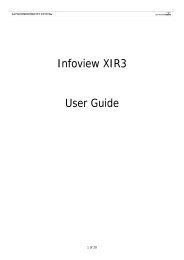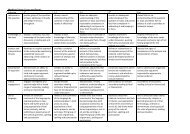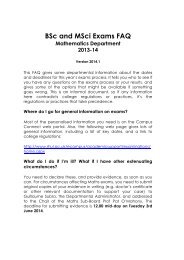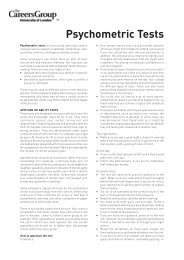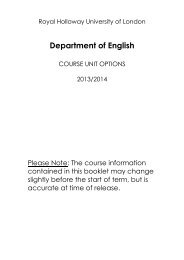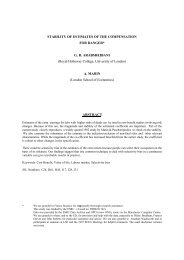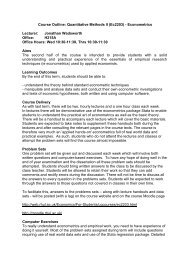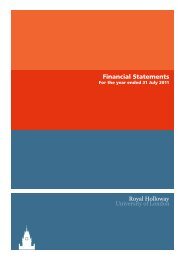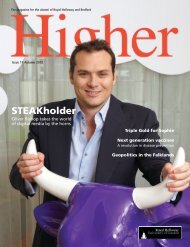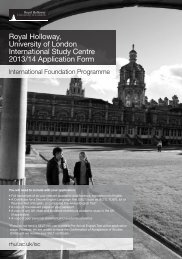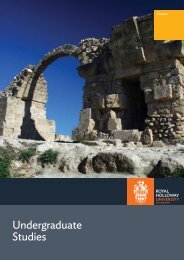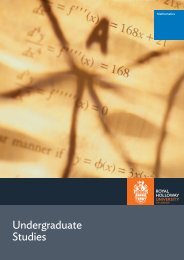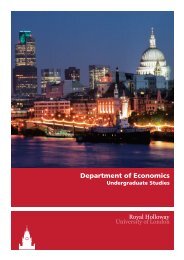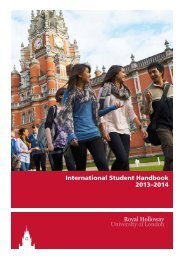a short history of the ISG - Royal Holloway, University of London
a short history of the ISG - Royal Holloway, University of London
a short history of the ISG - Royal Holloway, University of London
Create successful ePaper yourself
Turn your PDF publications into a flip-book with our unique Google optimized e-Paper software.
The Information Security Group - A Brief History<br />
Konstantinos Markantonakis BSc (Lancaster) MSc MBA PhD (<strong>London</strong>)<br />
Konstantinos received his BSc (Hons) in Computer Science from Lancaster<br />
<strong>University</strong> in 1995, his MSc in Information Security in 1999, his PhD in 2000<br />
and his MBA in International Management in 2005 from <strong>Royal</strong> <strong>Holloway</strong>,<br />
<strong>University</strong> <strong>of</strong> <strong>London</strong>. His main research interests include smart card<br />
security and applications, secure protocol design, Public Key<br />
Infrastructures, key management, mobile phone security. Since completing<br />
his PhD, he has worked as an independent consultant in a number <strong>of</strong><br />
information security and smart card related projects. He has worked as a<br />
Multi-application smart card Manager in VISA International EU, responsible<br />
for multi-application smart card technology for sou<strong>the</strong>rn Europe. More<br />
recently, he was working as a Senior Information Security Consultant for<br />
Steer Davies Gleave, responsible for advising transport operators and<br />
financial institutions on <strong>the</strong> use <strong>of</strong> smart card technology. He is also a<br />
member <strong>of</strong> <strong>the</strong> IFIP Working Group 8.8 on Smart Cards. He is currently a<br />
Reader in <strong>the</strong> Information Security Group. He continues to act as a<br />
consultant on a variety <strong>of</strong> topics including smart card security, key<br />
management, information security protocols, mobile devices, smart card<br />
migration program planning/project management for financial institutions<br />
and transport operators.<br />
Pr<strong>of</strong>essor Keith Martin BSc (Glasgow) PhD (<strong>London</strong>) CMath FIMA<br />
Keith Martin joined <strong>the</strong> Information Security Group as a lecturer in January<br />
2000. He received his BSc (Hons) in Ma<strong>the</strong>matics from <strong>the</strong> <strong>University</strong> <strong>of</strong><br />
Glasgow in 1988 and a PhD from <strong>Royal</strong> <strong>Holloway</strong> in 1991. Between 1992<br />
and 1996 he held a Research Fellowship at <strong>the</strong> <strong>University</strong> <strong>of</strong> Adelaide,<br />
investigating ma<strong>the</strong>matical modeling <strong>of</strong> cryptographic key distribution<br />
problems. In 1996 he joined <strong>the</strong> COSIC research group <strong>of</strong> <strong>the</strong> Katholieke<br />
Universiteit Leuven in Belgium, working on security for third generation<br />
mobile communications. Keith's current research interests include<br />
cryptography, key management and wireless sensor network security. Keith<br />
played a major role in <strong>the</strong> development <strong>of</strong> <strong>Royal</strong> <strong>Holloway</strong>'s distance<br />
learning MSc Information Security and is currently <strong>the</strong> Director <strong>of</strong> Graduate<br />
Studies. He is an Associate Editor <strong>of</strong> IEEE Transactions on Information<br />
Theory in <strong>the</strong> area <strong>of</strong> Complexity and Cryptography.<br />
Keith Mayes BSc PhD (Bath) CEng MIEE<br />
Keith received his BSc (Hons) in Electronic Engineering in 1983 from <strong>the</strong><br />
<strong>University</strong> <strong>of</strong> Bath and his PhD degree in Digital Image Processing (also<br />
from <strong>the</strong> <strong>University</strong> <strong>of</strong> Bath) in 1987. During his first degree, he was<br />
employed by Pye TVT (Philips) which designed and produced TV broadcast<br />
and studio equipment. His PhD was sponsored by Honeywell Aerospace<br />
and Defence and, on completion, he accepted <strong>the</strong>ir <strong>of</strong>fer <strong>of</strong> a job. In 1988,<br />
he started work for Racal Research Limited (RRL), at a time when Racal<br />
owned its core defence business, Chubb, and a small company called<br />
Vodafone. During seven years at RRL, he worked on a wide range <strong>of</strong><br />
research and advanced development products and was accepted as a<br />
Chartered Engineer. In 1995, he joined Racal Messenger to continue work<br />
on a Vehicle Licence plate recognition system (Talon) and an early packet<br />
radio system (Widanet/Paknet). In 1996, Keith joined Vodafone as a Senior<br />
10



